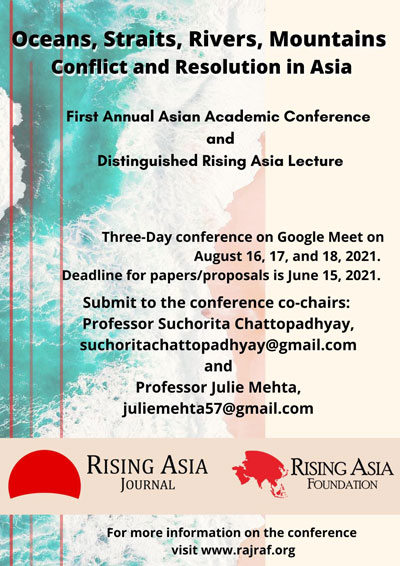
Rising Asia Foundation invites proposals for its 2021 annual three-day multidisciplinary conference, to be held as a webinar from August 16-18, 2021. The deadline for papers/proposals is June 15, 2021. All proposals should be submitted via email to the co-chairs of the conference: Professor Suchorita Chattopadhyay, suchoritachattopadhyay@gmail.com, and Professor Julie Mehta, juliemehta57@gmail.com. In your email, mention “RISING ASIA CONFERENCE PAPER” in the subject line.
Asia is witnessing ever-intensifying conflict over the possession of disputed mountainous, maritime and riverine territory and resources. How did we get to this stage? As a continent, Asia had never really been united. The Second World War saw one particularly aggressive Asian nation invading several other neighbouring states. In the Cold War, the continent was divided into opposing power blocs. These divisions were often shaped by powerful countries that attempted to reshape and rebuild a new prosperous Asia, in one historical instance, or a new non-communist Asia, in another instance. Ideologies and reform were at the heart of these impositions that went very wrong. In the end, the ensuing wars left behind unresolved borders—some drawn up by departing colonial powers, and others by a newfound neo-colonial impulse in assertive Asian states—and a dangerous legacy of simmering disputes.
Often between two or more countries, these disputes are driven by a new hegemonic aggressiveness as one power or another attempts to project itself as a great new power surrounded by compliant states. In this power play, extreme nationalism and hegemonic self-image develops in the citizens of the country that aims to dominate. These hegemonies not only affect the countries that are forced into submission, but they also affect (1) the inhabitants of the areas located on the borders who are ignored in negotiations between states, and (2) the diasporic communities such as the Chinese in South and Southeast Asia, or the Indians in Southeast Asia. The hegemonies are also seen in a growing number of trade disputes between Asian powers and the West, on the one hand, and within Asia itself, on the other.
After the turmoil wreaked on Asia by the Second World War and the Cold War, a new Cold War appears to have started in the continent, running dangerously alongside the territorial and trade disputes, all of which should be studied at multiple levels of analysis at the local, national, regional and international levels.
The conference aims to explore the disputes, the conflicts, and the hegemonies from multiple perspectives, across all disciplines. Papers should focus on Ocean/Strait/River/Mountain-scapes as the spaces of dispute and resolution, through the following themes:
Scholars should approach the topic of "Oceans, Straits, Riverscapes, Mountains" from the unique perspectives of their own disciplines, for example, historians of Asia may identify threads that unified and divided Asia in the past, historians of health may look at pandemics as points of rupture and convergence, anthropologists can look at indigenous communities’ concerns across the continent, and foreign policy and diplomacy scholars may explore war and peace, and so on.
Scholars may also approach their topic through appropriate discourses, for instance, of postcolonialism, hegemony, international relations theories, feminism, and others. Presenters must ensure that their papers provide a fresh perspective, a novel approach, or a new contribution to the literature.
The Rising Asia Foundation will invite an eminent scholar, academician or author to deliver a 45-minute lecture at the conference. The Program Committee will select an appropriate distinguished lecturer.
Who May Participate in the Conference?
Anybody who is interested in the multidisciplinary study of Asia such as University Faculty, Librarians, Graduate Students, Film Makers, Journalists, Museum Staff, Multilateral Institution Staff, Publishers/Editors, Independent Scholars, and Think Tank members.
Deadline:
Proposals for papers may be submitted immediately until June 15, 2021, which is the deadline. After the submission deadline, all the proposals will be reviewed by the Program Committee and its various Sub-Committees.
Types of Papers:
There are three categories of proposal submissions:
(1) Organized Panels, (2) Roundtables. In these two categories, the presenters should get together and decide a common theme. There is a maximum of four presenters in a Panel/Roundtable, (3) Individual Papers: We welcome submissions from individual presenters.
Further details for Organized Panels and Roundtables:
Each Panel or Roundtable must nominate an Organizer or Submitter, who must collect and provide the following information for each person participating:
Further details for Individual Papers:
Individuals submissions should include all the above items (1) through (5).
Disciplines and Fields:
The conference is multidisciplinary, spanning disciplines and fields such as Anthropology, Archaeology, Art/Art History, Asian American/Canadian/European Studies, Business Management, Cinema Studies/Film, Communications, Diasporic Literature, Economics, Education, Foreign Policy/Affairs, Gender & Sexuality, Geography, History, Information Technology, International Relations, Language, Law, Library Science, Linguistics, Literature (including World Literature), Military Affairs, Music/Musicology, Performing Arts, Philosophy, Political Science, Population Studies, Psychology, Religion, Sociology, Translation, Urban Studies, War & Society, and Women’s Studies.
Geographies:
Submissions should focus on a particular geographic area of study, or a specific country or countries: South Asia, Southeast Asia, East Asia and Northeast Asia, and China and its neighboring states, as well as Australasia.
Peer Review and Acceptance:
Publication of Book:
All paper presenters will be invited to submit finished papers for consideration for publication as a book to be published by Rising Asia Foundation in collaboration with an international publishing house. The deadline for submission for final papers is January 1, 2022. Papers will be selected following a peer review. Authors should prepare their final papers according to the "Submission Policy" and "Style Guidelines" provided on the website of the Rising Asia Journal.
